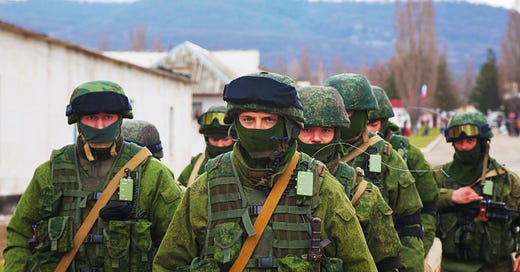As you’d expect someone who named this newsletter to claim, 24 February 2022 transformed the European order; it was a date as transformative as the breaching of the Berlin Wall on 9 November 1989.
Yet, as Gwendolyn Sasse says in Russia's War Against Ukraine – published today by Polity – the war didn’t start 19 months ago. It didn’t even start with Russia’s first armoured incursion into Donetsk on 11 June 2014. No, she writes: “Russia's war against Ukraine began with the annexation of Crimea on 27 February 2014”.
Like other books, Professor Sasse’s new study analyses three decades of diverging Russian and Ukrainian politics and society, developing Russian neo-imperialism, and Western temerity. Unique to this book, however, is the restoration of Crimea to centre stage in this conflict. This is especially salient as Ukraine steps up its long-range missile attacks on Sevastopol culminating in the destruction of the headquarters of Russia’s Black Sea fleet on 22 September.
Listen to the podcast on …
New Books Network
Apple
Spotify
Crimea "is an aspect that is neglected both in telling Ukraine's history since 1991 and also going back in time,” she tells me. “The Russian colonial narrative of Crimea is omnipresent … We've often heard sentences like: 'Yes, 2014, the occupation and then annexation of Crimea was a breach of international law’ but then often there's a ‘but, wasn't it always Russian?' … In our own thinking in the West, it's not differentiated enough and there is one strong colonial claim to Crimea voiced again and again by Russia. The history is much more complex. For example, the Crimean Tatars don't really figure in most public perceptions of Crimea ... I'm not suggesting that we should calculate how many years one empire or one group ruled in one territory. The baseline is that Crimea is part of the internationally recognised Ukrainian state and that's where it belongs. Nevertheless, the more complex history is important to understand and also to counter some of the simplistic claims. Because there are Russians or Russian speakers living in Crimea, it should be part of Russia. Or because Khrushchev apparently ... gave away Crimea in 1954, it just happens to be in Ukraine now and that's not where it belongs. These are ... Soviet Russian myths that need to be deconstructed and understood properly”.
Given Crimea’s symbolic importance in Russia, can a settlement leave it in Moscow’s hands? The Ukrainians were prepared to negotiate a 15-year cooling-off period in the first days of the full-scale invasion, she says, but “that is completely gone, through everything that has happened since last February … Clearly, the current offensive on the Ukrainian side is also targeting and will increasingly try to target supply routes to Crimea so, even militarily, the status of Crimea is by no means secure anymore. So, with that, all kinds of other scenarios become possible and, therefore, there is absolutely no room for negotiation at the moment”.
For my Writers’ Writers tip sheet, she chose The Frontline: Essays on Ukraine’s Past and Present by Serhii Plokhy (Harvard Ukrainian Research Institute, 2021) and 100 Kinder: Kindersachbuch über den Alltag von Kindern auf der ganzen Welt by Christoph Drösser and Nora Coenenberg (Gabriel Verlag, 2019).





